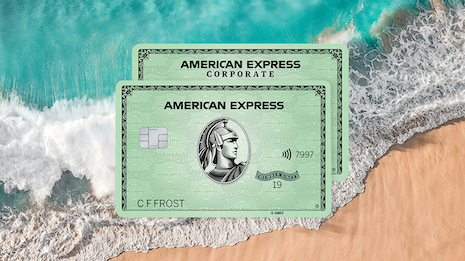American Express is ramping up its environmental efforts with a new global campaign in partnership with a marine conservation group.
The company is introducing its first credit card made primarily with reclaimed plastic collected from beaches, islands and coastal communities by Parley for the Oceans, as well as a new recycling program. Consumers are increasingly choosing to support businesses that support their values, including sustainability.
“Each year nearly 8 million metric tons of plastic enters the oceans, threatening the ecosystems and wildlife that inhabit them,” said Doug Buckminster, group president of global consumer services at American Express, in a statement. “As part of our brand promise to back our customers, colleagues, communities and what they care about most, we’re committed to raising awareness for the issue of marine plastic pollution and doing our part to care for the oceans and coastal communities that we all share.”
Supporting the oceans
By the end of 2019, American Express will unveil consumer and corporate Green Cards made with reclaimed plastic. The plastic was collected by Parley for the Oceans, an organization focused on combating marine plastic pollution.
Next year, Amex card members will be able to mail in their expired consumer, small business or corporate cards for recycling. American Express is also completely powered by renewable energy and has begun to eliminate single-use plastics across its global operations.
American Express is sharing its work to combat marine pollution on social media
To further engage consumers, American Express is encouraging social media users to visit the @AmericanExpress or @parley.tv Instagram pages and share why they #BackOurOceans. Through Sept. 23, American Express and Parley will remove two pounds of plastic from beaches and coasts for each comment, up to 1 million pounds.
As millennials acquire more wealth, they are also approaching their finances and investments from more purposeful perspectives.
Brands need to consider their social and environmental impact, not only for their own values but to attract affluents who are more concerned with social contributions in terms of legacy.
A report from The Economist shows that more than 66 percent of high-net-worth individuals in younger generations in the United States believe it is their duty to use their wealth for social benefit. They want their legacy to be more rooted in family and social contributions, says the survey commissioned by RBC Wealth Management (see story).
{"ct":"Vt1550Uk0jBkWQzW2+jWc7Qx58gGyF5e1SKhkP3wUTDvA6P5jcWiKIX3duM0UdLQTuMbQVrrQYjLtmhj98cbnjvou\/W6OnoY60hERARiVCaZ7q8G+sTrJjng\/uKR99lSc6ASxQB+0rPMfu6hn7g794c+YnggMIhv4n+eHNqgNqBB7tGdhtmdPshGZ53cr8QuZRdIPvZzKfYAE1dpLsNGRqZ7nXREGKRv3Z3ZAEFssGnei+KGv16k+ySR4TlX0nI35LLu7KoWpK3xOy7dIDUyLUiNVL11fUFpTEOlmV32cgp7W87OO89SXc6APV6UNFYs6ye3KDIKillR2o+Mam8IX9m9uPZ0x+eXQ9zksOglfc62k18Z8E+1pTfoXw7w4vPGO\/VLXchmlXogg3Rp5Il2M\/SRClA5TYx4Ra+WX5oSaiJwo3szH7p5PqHH8+4WTpcZgrnaNQucul71bs4P+flR44vvSp7P9JYFcu8gsjbQLwahRMOOlKWnoFObN2MK8ZPPK6Rq+vSMEMLmXk\/1knl62wVv6vMqzXh6n68TYVH1VoBV+BfjIwm0CFpKCdarQbhvn2lDm3whSf9oySrXCN4MzyGJUf+w\/vp3W5b6kJ5wEOve64R5fD90EHD\/AsPPUFRKfkGTsGQu\/NhulghbitnN+\/GXE0Gjyia9bcuvaivw+R9aEasckRo\/ax0ly+ZztMFQmAQSOSTQHoNLjgCWFw3K5qBf2kHB8PqKt\/Cjg9YzcerTK6A1y\/k8uZZTfx0TG9JR2BcmfOqLTCo36bQC0Pgr7fFKui\/MmFvr1DJAii7XPa8fYG4LgiYMKFaR7wUE+s7rDBCbf7V7yETYjO49U7iX4wbAqDVIo5sc2x+srOR0lxEzjKonRlzyoXzI2LtNeSD5dKCF1XlLC2dkZxQk4f\/GqvuRUMKE\/ezu2d\/UtdMyqofHPCbtUvbhPJSBoxfIQx3LOduQbEuXFgzEdZbaD6ZfnWXwjneSAnf2XMJy8N805FEc8oEk6Up2LQiIv65Vy8q9\/2+7wFLwA06mUprUwM7CbTpH6UpYK+0hmM\/N\/p+yVZhr+AYgBDJn2pW54XqyymwPLOXFBa7m6V43uUAI9tOyFl7TIyY8HVIc0CU6V1gDYnchJ+0MBSaaqGTs\/oKHzzzfQyAQwemSYj4d32Pca+px9kqnutJelUlIycQ5mXgydpB4tovc4gCD4ZKMLHBsrz4YKWta59c1AekNuSO5d+odMxCfuDXp2du6vP\/6B1tgjstxV5Ce17tYiQ6uIJStxNECaX4Gzv9EGbMw+\/FKLq8FVLIRgJfHKWbD\/\/AaddfBH6FbDbGSFaOMy+1mBGHKuqcRHPTlkWwdPdOdkMKyzGL0gS69Q4Tsyjz1h17tHk2UonJyFXcH1mOxTCNwt0zosZ0zQt7\/YLFuiq1QIvuBcHIX8xO3a2xlz0iy8VmkcXi3hDi69p1l2rRl3O6BH3\/xwlPrsl4H9M8+QyaX5WdkDp7ELTfitCAnUYZiYsDkTOCoRDc4PC5peqAXx89BHrrc9VmdRIvKzC014iAqs04\/5Yu6m9FNyw6V4qwQdS+w14uawKvut5otA4yAQmeY1MbYPRgvheL7Ce4kpZvyLrrHQOrCafGmaiBG8IkCqz+qNTugpaE9kjswPmn5ThUn2sKHyNXSZKIfl7nzogfYT5cQdrI5OCnX7xtyOpdly8fljeOVR2sJrNtQdoJVUjpyocPHyztNKiGs9SddWKbq6+pJLVcfIlQ2K2Uhiv\/lG9hYOQwTIjr2h1reRiZJQfFKi6oP+ltl1fo8x57oJkmwu\/FlvA3LdMDa54A5KU6xbGenzHYt7J1fB7xAsl96KQhxWsXA7B5abHeQlV\/rnr4a\/CGPahQQxkwIyep5p8vYXEzt3kdnfpfb8QTzXXjuE6C+lXOb64df9emP\/1kqmYompP2JHUlafXfXOwo01+XRXvpij4M1fj22RlI6J2pdGpnUcz9P3pFps9STKx4FZoZHdelrxarFzlvixKyZmHGXVDcCNGJfwb6rZb0IYlO+9Czj5a+JrpS1g4EKVF5x\/kw4lZ1uhnX2rs4EOzQqVz6G1aSNTKpHpYvm499iyiJgEGTePSzD7jkbqY87ydQ3t5PoyKPw19mFbgRUrDEr5yVUDSvOdPpd2tQolhVm6v1GNyfs4Ub7rAhsp9DK+xwE0aoDLsS+WOjRhnB+fVU8cTUykceZNuRF7fH8qep+20hMIT\/yQpolFXwSmpKxCgcyKVLexMz\/3McagtJtbgsYCBGEFjtDY7UWXw5UNsMl2aSFM8XazlFPchzTt1h56CGxzxirOCvinSQxZ7Jx79rukLKOyMtA6RO6gxSBYPJoi4lhumewOXJ\/gLhjGmhM2CqyxWrVExc76bD5WCxdduhQIb3TY6CIgMuxplhYdnoy+vD2Rb8HxTVjoAa2N+XYpwUx4mH68vYCi8mDSBcxO37IGwshi5fb1H2XMSTsql9+dfYGo26kxrgEiyhWK+JhFj0Qv05ELTaaO\/6K2etdvGxBfcYt1zGLkqh79zbY2UAAf\/gvFSkXECyTT7a82VHjLlfjHhgZts0FCc4nCNrP18hUeAjVbptnq5etQIIf\/5cmxxKtKcU2rUcIZGuM92Tt0ZXhtpnIhrFw\/zmmfnLkFL51bPCN4mlPs67qaydtszOxba20DEy3shy5lZazYWPKhLWnK+HV\/ugCMuw1CRbXF4vHNdwWqicQWYtVnRGlGxkam0bcaTWO0YwopBu4jA\/fh17QEhWhPSRS03zpmcO\/HUMAS4\/Ile2lsoO4IVyszPey6dVBxz5Z\/zhHaO9YejI9tLLutpJ8xMyWX8i7dnz2if5Zne79gmBbLDdxPSiiOpxUEwKQMNcz+JMGxag86OG+WzBaTVQEmG041YFh2E92K44kEZ0DU23GgEAy7EO9dGWm5EIYIRYiq6aZVDDI0DEJ1KhaEy9IIL2aULiDWGNOy1lhCJBxHBjFItWPLJwz2wBAUkUzfycVAFYvsmr\/n\/xdxUH\/b2\/QOYk0cWPFMXySa87RL6vq9wFikuTltEJA+S2Me\/O\/lapa01yJl5Plu\/a0QVDeFfHvk0FuyHlW4wkM3rzpTyUDJBqfCdp7QMBAvt9xnsDCjG3hfzi2IczGvlLhxcQB64eNIo2qVCjhfwToIR69Y1DdjTSbujR\/AVr1jrJh24pIYxp4OlomOxmUmDhYL\/wYL4EqmE6djxe88tKN6CoK5TzUE7a\/XrGj6VMbZTuDMNWtSbXr2IT2o3kTLZBZtAkwRrFdBLfRiFM41YcpxEW81hEPLqMUgJoxrcHYkf4F1lCwaommrEKWYUS7NgiFFVuCEZYMSaLpi4BfMKFrrBmHD2qwjYyAF2mQtMqvXhO4W\/pCr92PWvKJoKybdXxVIWuAe2yQusqfz697mWDnHSaFy2CllBXFWKyuHDI0BfLojkf7C76yuaUOILQLClIl2DBKZXZpx1Uk5eU\/IKKFBE6Hh39y7EC7\/eEHIxhmYyeXT2P\/Y+lys\/N4lcpRbJmbWBy7TaDIvHegXFAbJxAh+kPPHORIic5DQ7aqIvIsQ1OYm2K+eG1CDDjeTyZfasTGdPcaDoQgoLmQZA6k4\/Tyi6128hlFbxfg5Coi\/+2LHuK3KEcsHNpmMCINMe9L2BQc8XNL+piqUYkD6ZPu6GDbN2EKgYng8bkugHXrp09xYW0GUKMEu5CzYDBXAXWb9CGtAtE4TFC75ubKqTPgvVL7c12o8e1BYwfMHMDzHQD7ooWoWQkbY+6FWIbVSqg2RIJMkycCOs\/cYyvdXsRldg3pJIX5b\/AG5WlHrPbdGNEj4LBetqX\/khYVmEtfipba+exD5MsJemC3x4XNOH0KV1QHLHau\/27GLKD7JaQjMZCMWQ7wpMdICyGFJlyLt53Ri0MRJWwDGOu3MoWntrLUCiYwosp9OF0i4KfFnZMYQCeDIQ1EWfjh6JQ6YRuTgdw+bdFm6v36L0ZMzkRrZfvrp2MerCX2rEqBHpg9PlRFRIqc70lEeoqV63xrGRsQfGg631TpsQFh5dAak3tq0zhJjKLM0NkoposIYQZin5LPPpR+7GhbCor3docEgcdRGFz+nOzvjy36iAup76J8NFrjSc6RZZ+PRpL633NqpO4qP9WuD\/FTa45U84ruOxp7djMDxmFV3BkB6iUi\/J8EEYmoSlzi+1chrPtYxKrSZyJUcImQZvKGY6DkKBjDSILk\/XqTPAadgPIW79k\/rSg3rW+Yu\/2EglqYn2H0kSDPKK\/\/MN4ESgVjSuE+GBjpckRBCFaCUCXzqChF5rpo07A6VAJsuQMAMyZg1TA0BIqaTwmHN9wQHLiRou1Mh1khgKwG9l1JcjuYHs8MTqZPkKjHk7RarezHxWqTJl4\/t8r8S9h2UB2xiri6NyFsOyoja2cfpCZcinPscs4nZnjuYjTYxBtaLPNtl2E\/tTjs7NTjNajx6D3yL6krwfIiaX6nmgYTjKg8k9s1UuK34MecWsTEIIjEh1doECVQ8rcmBfTl2r5gPJk+nwobC4jWz9bb42byjM\/Wi6zn9y+XA2VKjHvprzBnvi0ATL2bJb1qaENtlqYK1pWIdWKmrqaAnAo7K5dw+cx+lhM6AEHNUI+yAAN5bt6Ez9CrUBddc7HIRuLHiKHQsZUr4kqwaiEV+mn4E1GMdNXDj0gVJjfmU9LoCsAVurwWqhTLGyuF2m7aul93y5ZBBwBSH5BxQxqsbaysMFCEv4I\/YQ+3Hrq5y4oenySG5q6vim38wQGMwSt2Hs\/YlFQNXyLyDb7iDPbwt+GXX\/umdpaG8ceRGDb9RtzF599c8blxU9+DBI9WTmWLIpHkYBvGLfSxJ+vQC1zYVoo\/dbxGq4kMTetD1J8raeLoNVLAwAFieQ6TwcC5H+n6bZmKaR\/mff0D5d7cz61wtlv9DUPonQnwuWzb4\/chQA2mT8eVmzNz\/N+y6qDzPVKbRgO2w8fdUGqKVqMkhTxM6bFuQ7SIc4K2m3HgBPdLDubPVkC7S86d3qRIrF8fS6WJZVcVMLxMuCjTxSIObg\/bUt1gMMcwusUPVNhcT3iHlRKjYGPvyKfR5YlFcwcqdh15pCEXoFxSfK3SPBNsArQofHiX4p7wNpLz5WH+T1nhbN4t7FQclE377QVBD2eBGVnyo5O8iFt5DqYVvanF2pjD48JNtb8UMUywOJQVijUdBRXoK1TphaR9SAcprylV80sE0yHL8ODHs01Zcb8fw32YDB5A4\/UFel9bUUpS9z3A34ueMuVxB5cjNFKhGHw\/6xtr3ctTQemFhB\/JJepgoBBMnzo9s+bjWCqmByobaVgf\/NU9zUpvip6dKK824UIKDRptvmPEXMpPYjrxzbscJkTsbwhdr1zg80XlEmiv7Pt4ny4c+paDMRogYjzVLaYTb1cFymA73jbsdGJnQVGLlNkZ5iRHHRVCrEwDXBULMnic2WyzmfoSw\/rovz3BGohkhbCwmCfvuzm1MZcAA34LUOahgUD\/hi2rPvJefOQfc4ZNIK6kGK9Ee7tqVvm\/ydzSXhJgptCQHd1oZ9\/riUK1cYW5IdyQvDw+A1nQoehDNX8X2SlKoRvRqsXcjg\/n87JA60hTi81LQy4\/JorF\/0qH5lM0QGXvHe5DLp+4lxPKt5752BGn1VpPGR5GnZAin+Mdq6vwLgtmknMc2br9u+Ad4RdCXlO5ospWFUyQVSzaIYIsH3xcDpk2Yv7av3ZzUFc1rzmfU8Y2I1tjuzMHZnAU62RXKs4BrVry+Ugf1S5LDzInd97S4Q+CQERSpiFunZI3eLnVLyvZUrdKR0QsJc\/+MoiUKXEcWZM9Usn+GjLABMXq9SkenS0E38AqV2kdb9Y1DUBoZkoLf\/L5K2fduOo7fyXwDKQq\/Yal3eo6pNEdFc4rrQedMGr39inVc5u1THbGWf2ZscVTrwucOcYpkPTvYeAKlP7eo20spO0NdyPg6A9MsxK0jVFuooje0pt\/yPsKd5PgOMLjOzht3uzOA6syockpr6iGC4dPd4WPSJUkER9iU\/Xs23+25tZiVtrI0h8y0vA6ng5SaqnOrM6X0EbyNpnw3D9m7Cdur4kLptowcoGvxausMrsLgJTV2IBItcLjNBme\/gz2PoaSaR+r60dJ3q4Wbymk1hCSPlQSDIIGnYPiNBQ\/g+Qc+jvmQ+9xSn8Fy8s1C9ZjeqYY2T2fqQgtCq6kGdwmDbMEHrWJu6kkbSpwoekPnl7RbKSgscu5scnzauhIut2Y3pjAKhoJMFw4omJAwznt+CKPIp8i0CD+NVRZ2Gj1MqD0ceRwrekl4eSJp+k9ZOpCNNN3VnU6aMCLxdgWoOzMo+WWuOVVWKOI3EtZ\/vPkxSzZVZEQAtXA6e9tKZNlr3QyS3JqyG+uJsBcyh5ipOKxTaaEzAHI1mb8Hx3x4FNNEnwf8jpF0B2GvyCEdmTLCwzmX9fy9thmuKTLSaLtih5TGkq2eh0c\/cKoVZ4cU\/e80et1nK3aU0umYnz8EZmOIFwDRfwVnkA=","iv":"3f808653f0eab2722e746f15a5738243","s":"334ba57124f00483"}

 American Express is introducing credit cards made with reclaimed plastic. Image credit: American Express
American Express is introducing credit cards made with reclaimed plastic. Image credit: American Express